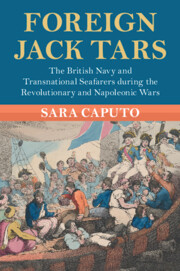 Foreign Jack Tars
Foreign Jack Tars Book contents
- Foreign Jack Tars
- Modern British Histories
- Foreign Jack Tars
- Copyright page
- Dedication
- Contents
- Figures
- Tables
- Acknowledgements
- Introduction
- Part I The State
- Part II The Nation
- 3 A Babel and a Gehenna
- 4 ‘Complexions of Every Varied Hue’
- 5 ‘They Cannot Keep the Sea beyond a Passage’
- 6 ‘From among the Northern Nations Alone’
- Part III Displacement
- Conclusion
- Book part
- Bibliography
- Index
6 - ‘From among the Northern Nations Alone’
Dutchmen, Danes, and Norwegians in the Fleet
from Part II - The Nation
Published online by Cambridge University Press: 03 November 2022
- Foreign Jack Tars
- Modern British Histories
- Foreign Jack Tars
- Copyright page
- Dedication
- Contents
- Figures
- Tables
- Acknowledgements
- Introduction
- Part I The State
- Part II The Nation
- 3 A Babel and a Gehenna
- 4 ‘Complexions of Every Varied Hue’
- 5 ‘They Cannot Keep the Sea beyond a Passage’
- 6 ‘From among the Northern Nations Alone’
- Part III Displacement
- Conclusion
- Book part
- Bibliography
- Index
Summary
Unlike southern European sailors, men from the North Sea basin were Britain’s cultural and geographic neighbours: their linguistic integration was smoother, and the stereotypes surrounding them more positive. In 1800, four ships entirely manned and officered by exiled Dutchmen were even allowed wholesale into the British service. This was a rare experiment: if the Army often segregated foreigners in special regiments, the Royal Navy usually operated as a ‘melting pot’. Presenting a microhistory of this episode, Chapter 6 shows how similar institutional cultures facilitated this kind of integration and administrative translation. The Admiralty also highly valued sailors from Denmark and Norway, as reliable and skilled manpower. At the same time, these very qualities made them potentially formidable rivals and enemies, meaning that their recruitment provoked diffidence and concerns among British elites and seafarers. The problems with which the Navy had to grapple when recruiting southern and northern European men were specular to each other: prejudice held the former as poor workforce, and thus of little use, and the latter as exceptional workforce, and therefore dangerous. In neither case did the negative implications ultimately carry much weight for an institution that was only concerned with sustaining a strenuous war effort.
Keywords
- Type
- Chapter
- Information
- Foreign Jack TarsThe British Navy and Transnational Seafarers during the Revolutionary and Napoleonic Wars, pp. 176 - 198Publisher: Cambridge University PressPrint publication year: 2022


